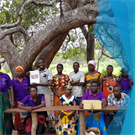Interview with Alaa Hamieh, Regional Business Development Director for the Middle East and North Africa, Software Group, originally published by Arabic FinDev Gateway, CGAP
By Miranda Beshara
Alaa Hamieh is the Regional Business Development Director for the Middle East and North Africa at Software Group responsible for driving the business and the financial inclusion mission of the company in the MENA region. Alaa has more than 15 years of experience that accumulate strong technical and business knowledge in the IT and Telecom industries and an extensive track record of hands-on experience in strategic planning, business development, project and product management, and system engineering strategies. He has previously worked for renowned companies like Microsoft and Noor Telecom and was the Director of Business Development at Noor Telecom prior to joining Software Group. Alaa is an active member of the Young Arab Leaders network and holds a Bachelor of Science degree from the Lebanese American University in Beirut.
Why is digital transformation important for financial inclusion?
Digital transformation facilitates access to credit and financial services that help lift people out of extreme poverty. Financial inclusion provides an opportunity for more people to establish their own businesses and earn a steady income. Institutions working in the field are not just providing financial opportunities but also educating people on how to manage their credits and develop their own business.
According to the 2017 Global Findex database, 1,7 billion adults lack a bank account and 3 billion are underserved globally. They have limited access to financial services, and most do not have a choice of adequate providers or services. We at Software Group have the mission to support the financial sector to achieve digital transformation through providing cutting-edge technology solutions. Financial inclusion is our primary focus. Reaching unbanked populations requires innovative channels and digital-based products that are overcoming the everlasting challenge of efficiency and sustainability. The statistics indicate that in addition to the unbanked population, over 200 million micro, small and medium enterprises do not have access to banking services. Digital transformation helps organizations in the field to be data-driven and more competitive by ensuring quick time to market and providing tailored products to their customers.
What are the key barriers to digital transformation in the provision of financial services to the poor and can they be overcome?
No one can tell for sure how the financial services sector will look like in the next few years. However, it is certain that institutions that have invested and created flexible, fast, and adaptive platforms will remain on the market.
Some of the key barriers that we usually face when we work with financial services providers are related to the lack of internal technical understanding and not having a clear digital institutional strategy. From a client standpoint, there are also some challenges such as the ongoing lack of trust in technologies. On a macro scale, the key is to have an ecosystem that is allowing and supporting interoperability.
What should be the top priorities when digitizing delivery channels?
The trend is for the financial world to offer more and more utilities and even greater opportunities. Services will be easier and faster, products will be more flexible. Systems will become more automated. Client convenience would be key.
To be successful in digitizing delivery channels, service providers should work closer to prospect markets. Financial institutions need a paradigm shift to increase their internal team acceptance and trust. As already mentioned, building scalable infrastructure would be essential for the future. At the same time, institutions should remain agile and competitive in the market.
What are the challenges and opportunities to achieve that in the Arab region?
There are huge opportunities in the Arab region mainly related to the vast untapped market. According to the latest report about the State of Fintech in MENA, the rise of Fintech is driven by four opportunities. There are around 86% of adults without a bank account, and SME lending stands at half of the global average. Аt the same time, the volume of e-commerce is set to quadruple over the coming five years. According to the same report, 1 in 2 bank customers is interested in new digital services and that is another opportunity to look at.
Moreover, the availability of tailored solutions is still limited on the market, hence, there is a massive potential for Fintech solutions companies such as Software Group. However, challenges such as rigid regulation and low adaptability make technology adoption slower. Political and economic instabilities are another important challenge that companies need to deal with. Hence, companies that plan to enter the region need to be patient and research the specifics of the market carefully.
If a financial services provider in the region is planning a digital transformation, what would be the 5 most important tips that you would give?
Here are my 5 most important tips for financial services providers when considering digital transformation:
- Top executives need to get closer to their customers and have a deeper understanding of their needs.
- When selecting a technology provider, organizations need to have the mindset that the company would be a long-term partner, not just a vendor.
- Data is crucial; before jumping into collecting data, have a clear data-driven digital strategy.
- Build a scalable and open IT infrastructure. It is not just about the functionalities you would like to see in the system but also the system architecture and design need to be compatible and be able to easily connect/integrate with others.
- Consider solutions in the cloud; roll out quickly and be agile.






